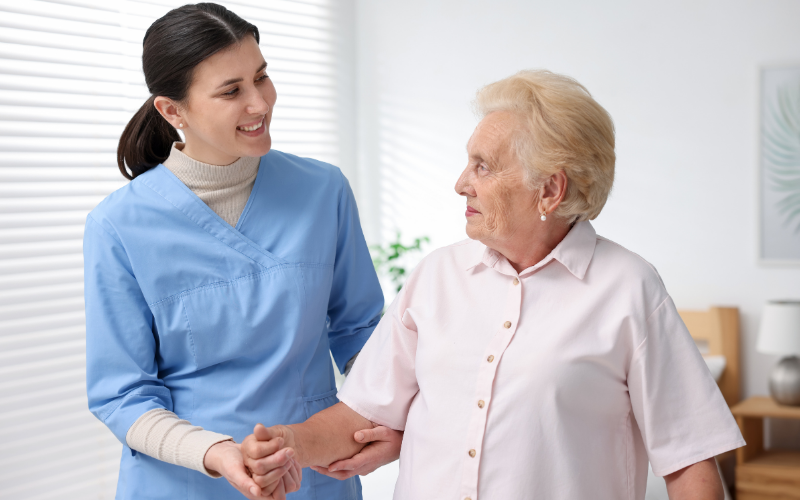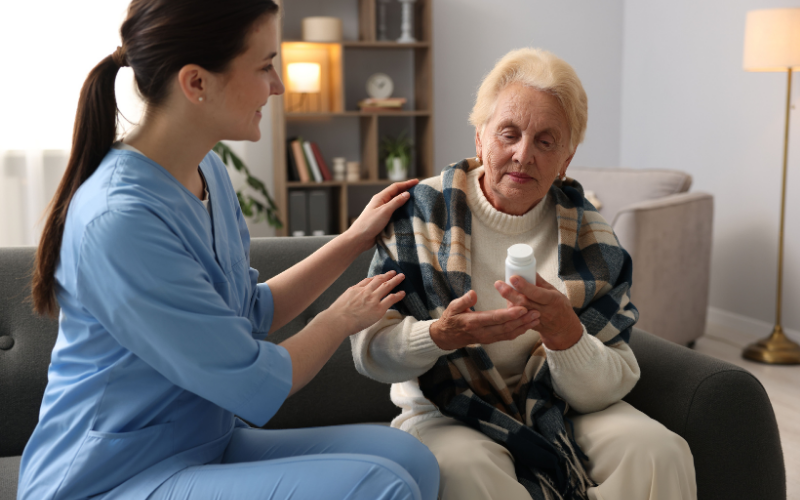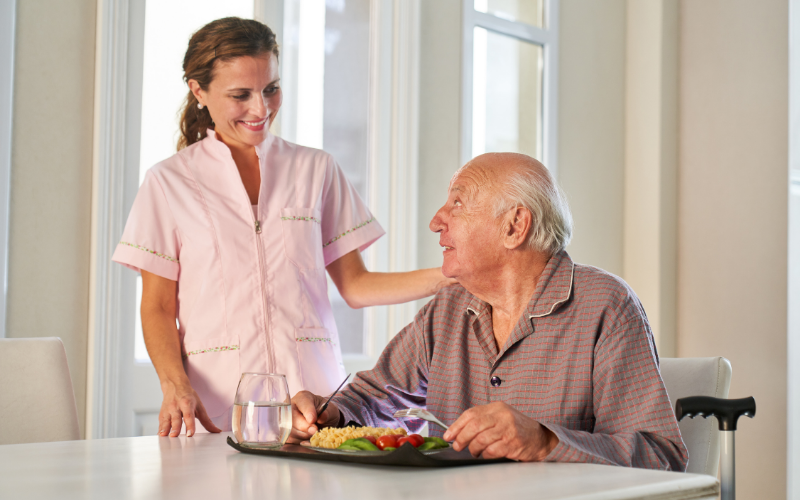

Older adults are frequently hospitalized for common health issues such as falls, heart failure, surgery, pneumonia, and other age-related conditions. Once they are discharged, proper care at home becomes crucial, not only to support their recovery but also to help prevent complications and reduce the likelihood of being readmitted to the hospital.
Hands-on assistance with daily activities, medication management, and monitoring of health symptoms can make a significant difference in how quickly and comfortably they regain their strength. By following these 10 practical tips, you can help ensure a safe, effective, and more comfortable recovery at home.
Why are Seniors Hospitalized?
The rate of hospitalizations is high in the aging population. In fact, seniors are twice as likely to be hospitalized than middle-aged adults. They also require age-appropriate care during their hospital stay to reduce the risk of adverse health outcomes.
Patients aged 65 and over are usually diagnosed with chronic illnesses and disabilities, which increases their likelihood of being hospitalized for at least five days on average. The leading causes of hospitalization among the elderly are cardiovascular disease and sepsis.
Due to their age, frailty, the complexity of their medical condition as well as functional disability, seniors require extra support upon discharge. This additional care may take the form of home health care or skilled nursing care. Quality home care is the recommended option to promote optimal healing.
Home care agencies offer reliable after-surgery care to elderly patients in the form of compassionate assistance with activities of daily living (ADLs). A professional caregiver’s attention and supervision give the senior the chance to rest and recuperate, accelerating their overall recovery.
What Tips Promote Recovery after a Hospitalization?

Tip 1: Understand discharge instructions
While at the hospital, ask the hospital staff all the necessary questions to fully understand the recovery plan. Gain a clear understanding of what signs indicate health complications. If complications arise, be sure to know who to contact for help. An accompanying caregiver can take detailed notes.
Tip 2: Prepare the home
The senior may be confused (delirium) or overwhelmed (if their health changes) after their hospital stay. Reduce their risk of falls and other accidents by safeguarding the home. Remove trip hazards, such as rugs and cords. Add plenty of lighting to increase visibility and grab bars to promote stability.
Tip 3: Manage medications
The doctor’s orders may include new or a continuation of existing prescription medications. Take these drugs as prescribed; a pill organizer or a caregiver’s medication reminders ensure the doses are taken correctly. A caregiver can visit the pharmacy to pick up the medications, too.
Tip 4: Prioritize nutrition and hydration
Foods rich in vitamins and minerals are essential for recovery, especially if the senior loses weight or their muscles weaken during their hospital stay. Prepare and serve balanced meals consisting of lean proteins, vegetables, fruits, and whole grains. Offer beverages throughout the day to promote hydration.
Tip 5: Encourage physical activity
Prolonged bedrest during hospitalization can result in muscle weakness and stiffness. Upon the doctor’s approval, encourage light exercise. Walking, stretching, and chair exercises are recommended for regaining strength and mobility and preventing blood clots and muscle atrophy. A caregiver can provide mobility support to promote confidence. Often, seniors are sent home with a physical therapy plan to continue their recovery. Encouraging them to follow these exercises can significantly improve strength, balance, and overall mobility.
Tip 6: Keep essentials close by
A caregiver may be responsible for shopping for essentials, such as foods and toiletries. Keep these everyday items close at hand and within easy reach to prevent the senior from bending or climbing. Older adults who use a walker should keep their phone and other necessities in the basket.
Tip 7: Schedule follow-up appointments
Prior to leaving the hospital, the staff will schedule a follow-up appointment with the doctor or therapist. It’s critical to keep this appointment to monitor the older adult’s progress and prevent complications. Seniors who don’t drive should arrange for a caregiver to provide safe transportation.
Tip 8: Monitor emotional well-being
Being hospitalized for a health condition can be emotionally draining for the elderly, leaving them vulnerable to depression, fear, and anxiety. Caregivers are advised to socialize with the older patient to keep them engaged, active in hobbies, and to provide the necessary emotional support.
Tip 9: Maintain a routine
Establish a routine at home for mealtimes, activities, exercise, socialization, and bedtime. Include periods of rest in the daily schedule. A consistent schedule helps provide a healthy measure of stability for the elderly patient after their planned or unexpected hospital stay.
Tip 10: Build a support network
Caring for an older adult recently discharged from the hospital can be challenging. Depending on their condition, continual supervision may be necessary. When family members simultaneously manage their own households or careers, taking on extra care responsibilities is oftentimes daunting.
After-Surgery Care from Assisting Hands

Rather than trying to manage caregiving alone, consider enlisting professional support from a trusted home care agency like Assisting Hands Home Care. We provide compassionate after-surgery care for a wide range of procedures, including knee and hip replacements, cataract surgery, and more.
Our services begin at the start of hospitalization and continue well after discharge. Families can rely on our professionals to communicate the senior’s discharge instructions, transport them safely from the medical facility to home, and ensure their environment is secure and comfortable.
Once home, our caregivers manage the senior’s recovery with services such as picking up medications, providing timely reminders, and offering non-medical transportation to follow-up appointments with doctors or therapists. We also shop for groceries, prepare healthy meals, and assist with activities of daily living (ADLs).
By supporting the non-medical care needs of seniors in the comfort of their own home, we allow them to focus on rest and healing in familiar surroundings. Research shows that recovery outcomes improve when older adults are cared for at home rather than in a facility. Seniors receiving home care also experience a 25% improvement in depression and anxiety scores. One-on-one attention from a professional caregiver reduces medication errors, allows for careful monitoring, and enables quicker intervention if complications arise.
For families in Palm Beach, North Palm Beach, Palm Beach Gardens, Boynton Beach, Wellington FL, preparing for a hospital stay, including Assisting Hands Home Care in the care plan can significantly reduce stress, increase comfort, and help prevent readmission. Call at (561) 566-5989 to schedule a free in-home consultation today to learn more about how our quality senior home care can support your loved one’s recovery.
- Tips for Recovering at Home After a Hospitalization - October 28, 2025
- Changes to How Medicare Covers Dementia Care - October 24, 2025
- How to Care for a Senior Parent While Working from Home - September 29, 2025
